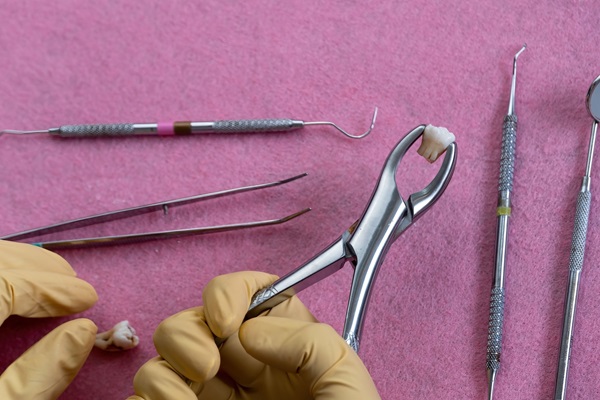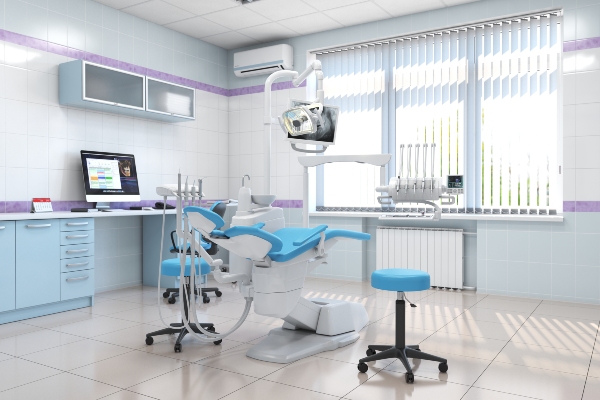When a Tooth Extraction Is Necessary
A might be necessary for multiple instances. The tooth comes out of the patient’s mouth because of an infection or other reasons. A dentist tries to keep the teeth intact as long as possible, but not every tooth can be saved. Keep reading to learn more about why you might need an extraction.
Why is tooth extraction necessary?
Tooth extractions are often the last resort for a dentist. There are two sets of teeth in a patient’s mouth, including the permanent ones and the baby teeth. The baby teeth are the first ones the body makes. Once those come out, the adult teeth are supposed to last a person’s lifetime. Still, there are some reasons a patient might need to have some teeth extracted.
Stopping periodontal disease in its tracks
Periodontal disease causes an infection in the gums, alveolar bone, or periodontal ligaments. One of the earliest stages is gingivitis, which causes bleeding and gum inflammation. But a more severe form can affect the structures of the teeth, loosening them. Bacteria in dental plaque cause the condition.
The plaque forms on the teeth within a few hours of eating if the patient does not brush. But regular brushing can prevent the condition. In advanced stages, the tooth becomes looser. Then tooth extraction might be the only way to stop further infection.
Severe decay-causing tooth damage
The tooth decay might reach the middle of the tooth, known as the pulp. The decay produces bacteria, which might enter the pulp, causing an infection. Sometimes, root canals are useful for treating the disease. Still, an extraction might be the only way to stop the infection from spreading if there is a severe infection. The dentist will examine the tooth and find the right option.
Helping impacted teeth
If the tooth cannot break through the gumline, it is impacted. That often happens with wisdom teeth. A dentist might recommend the impacted tooth come out to stop it from damaging the rest of the teeth. Extraction might also prevent the risk of overcrowding and infection. The dentist might use digital tools to examine the impacted area or affected areas. That means patients do not get exposed to radiation, increasing comfort.
Reducing overcrowding
Sometimes, patients have small jawbones or a large number of teeth. It often happens before orthodontic treatment, and the teeth have no room to move. Orthodontists can look at the teeth’s crowdedness and see if there is sufficient room for the teeth to move. That way, the teeth can become better aligned.
After an accident
Problems like car accidents or impacts to the face might require extensive dental treatment. Preserving the teeth is a priority. Then the dentist might use bridges, veneers, or crowns. But in severe cases, the dentist might recommend an extraction.
Aftercare for a tooth extraction
The type of care a patient needs depends on the severity of the case. Most patients return to normal activities in two to three days. Even so, complete healing will take place after many weeks. A patient who wants to have dental implant surgery must wait a few months before the procedure. Here are important aftercare tips after dental extraction:
- Follow the dentist’s instructions when taking medications. The dentist will prescribe pain relievers and antibiotics after the procedure.
- Rest and avoid strenuous activities. Do this for at least a couple of days. Stressful activities can increase one’s heart rate. This can lead to pain and bleeding. Skipping workouts for up to three days will allow the gums and jawbone to recover well. The dentist will say when the patient can go back to normal activities.
- Keep the extraction area clean. Rinse with an antibacterial mouthwash two to three times each day. Avoid the area when brushing.
- Eat soft foods and avoid hard ones. Avoid using straws when drinking. Sucking a straw can remove the blood clot in the extraction site. It can also cause dry sockets.
The risks
A tooth extraction can have a small degree of risk. Infection can happen after the procedure. Delayed healing can occur because of the patient’s health issues. Nerve injury and dry socket may happen as well. The maxillary sinus may suffer from perforation if the extraction is in the upper jaw.
Choose the right dentist for a tooth extraction
There are many reasons you might need a tooth extraction. However, the idea is to preserve the rest of the teeth as much as possible. It can also improve your quality of life. There are several options for restorations after the tooth comes out. Your dentist can give you more information on those.
Request an appointment here: https://pearlcity.diamondheaddentalcare.com or call Diamond Head Dental Care at (808) 214-9287 for an appointment in our Pearl City office.
Check out what others are saying about our dental services on Yelp: .
Recent Posts
Wisdom tooth extraction is a common dental procedure to remove the third molars. These teeth typically emerge between late adolescence and early adulthood. While some individuals experience no issues and keep their wisdom teeth, others encounter pain, infection, or misalignment as these teeth develop and begin to erupt. Knowing the signs that indicate the need…
Wisdom teeth extraction is a common procedure that helps prevent complications such as overcrowding, infection, or impacted teeth. While the surgery is straightforward, recovery is equally important in ensuring a smooth and successful healing period. Following a clear, step-by-step framework for recovery can minimize discomfort, reduce the risk of complications, and promote long-term oral health.…
A wisdom tooth extraction is a surgical procedure that is performed by a dentist to remove one or more of your wisdom teeth. These are the four permanent adult teeth situated at the back corners of the mouth on the top and bottom. Wisdom teeth, also referred to as third molars, are usually the last…
A wisdom teeth extraction can be daunting for many; however, rest assured that modern-day dentistry has allowed for the evolution of tools that makes the procedure safe and efficient. Even so, a wisdom tooth extraction can make for a pretty lengthy and involved recovery process. Thankfully, there are a lot of ways to make the…


